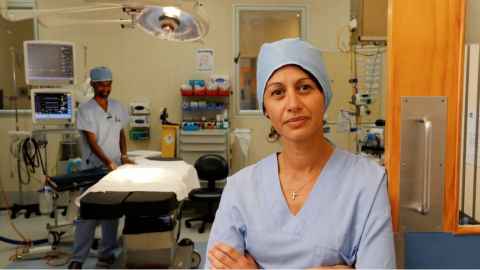Dr Max Ronald: addressing inequities
4 June 2025
Dr Max Ronald tells Donna Chisholm about her very personal mission to get better breast cancer results for Māori.

For breast cancer surgeon Dr Max Ronald (right), improving outcomes for Māori wāhine has long been a professional goal. In 2021, though, it became very personal with her own breast cancer diagnosis at the age of 49 – an event she describes as a “dumb irony”.
The University of Auckland alumna, who now works at Whangārei Hospital, is the inaugural recipient of a three-year Breast Cancer Fellowship, in a partnership between Hei Āhuru Mōwai Māori Cancer Leadership Aotearoa, Breast Cancer Cure and Breast Cancer Foundation New Zealand.
The fellowship includes research that aims to improve access to screening and accelerate the speed of treatment for those diagnosed outside the national screening programme. Māori and Pacific women are more likely to develop breast cancer and more likely to die from it than non Māori.
As an example of how communities know best how to help themselves improve screening rates, Max points to Te Kaha on the East Coast. The area’s rural, predominantly Māori population more than doubled its screening coverage to 98 percent after feedback identified a raft of access issues including transport, whānau-centred care and appointment scheduling.
The whole experience of being in theatre was such a privilege.
Her ten-year goal is to increase the coverage rate of Māori women to 80 percent, a figure she says would address the historic inequities. Only about 64 percent are currently regularly screened, compared with 69 percent of European women.
For those whose cancers are diagnosed symptomatically, like her own, the problem is more insidious; she says systemic racism results in treatment delays and poorer outcomes for Māori women, even those in the highest socio-economic groups.
Another of the fellowship’s goals is to increase the number of Māori breast cancer researchers. One of her masters students has begun a project examining the differences in experiences and outcomes for Northland women diagnosed through the screening programme compared with those outside it. The aim is to identify the ‘ideal breast cancer journey’ for Māori wāhine.
Max (Te Kapotai ki Ngā Puhi and Ngāti Wai) began studying medicine at the University in 2000. She had previously trained in physiotherapy, which she practised for four years after a school careers adviser told her that “Māori didn’t do medicine”. She switched only after reading how Dr Hinemoa Elder, a former television personality, had enrolled under the Māori and Pacific Admission Scheme (MAPAS).
The number of Māori and Pacific medical students the faculty aims to select is now proportionate to the young adult population in the North Island; Max is concerned that a proposed government review of the programme might see the equity gains whittled away.
“I think we’re all kind of concerned, angry, confused, hurt and gobsmacked. I think we have to be very careful and very staunch about protecting these types of programmes.”
Without them, the system risks a return to a meritocracy that might not be in the best interests of the population, she says.
“If you’re only taking someone who can get the highest marks in chemistry and physics, when actually the issue in the community is that we have lower outcomes for Māori, then you need to be selecting people who will be able to address that, and valuing that as something you need in your profession.”
Max’s pivot into surgery began during her training when she attended a liver cancer resection surgery by Professor Jonathan Koea, then the only Māori general surgeon in New Zealand. It was an experience that she says “blew me away”.
“The whole experience of being in theatre was such a privilege … seeing the inside of a living body and the strategies, expertise and instruments involved in manipulating that to help the person. I found that really amazing.”
She knows that she is more likely to have a good outcome with her own breast cancer because she, too, is privileged: importantly, she knew how to access the best care promptly.
It’s long past time, she reckons, that every woman has the same chance.
This article first appeared in the Autumn 2025 issue of Ingenio.